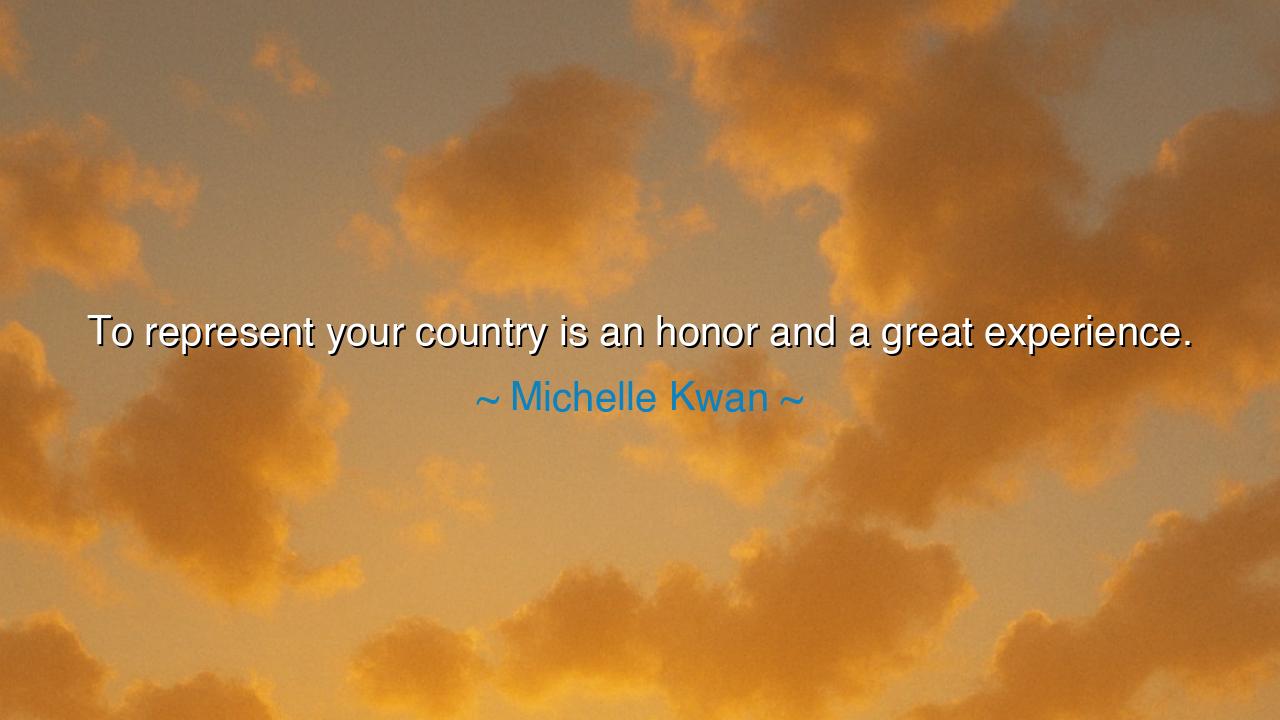
To represent your country is an honor and a great experience.






“To represent your country is an honor and a great experience.” Thus spoke Michelle Kwan, the graceful champion whose blade carved poetry upon the ice, and whose heart carried the weight of a nation’s pride. Her words are not merely the reflection of an athlete’s journey — they are the whisper of an eternal truth, one known to every soul who has stood as a symbol for something greater than themselves. For to represent your country is not simply to wear its colors, but to embody its spirit, to carry its history, its hope, and its humanity upon your shoulders.
To the ancients, such service was the highest calling. The Greek warrior who stood at Marathon did not fight only for himself, but for Hellas, for the freedom of his people, and the honor of his ancestors. The Roman senator, though clothed in power, was taught that his duty was first to the Res Publica — the common good. And the poet who sang for his homeland did so not for fame, but to preserve the memory of his civilization in words that would outlive him. Michelle Kwan’s words spring from that same sacred fountain — the understanding that personal glory fades, but the act of serving one’s nation, of carrying its dreams into the light of the world, endures beyond time.
Kwan herself knew the weight of this truth. From her earliest days, she glided not only for medals, but for the honor of her homeland — the United States, a land of countless faces and stories. When she took to the ice, she carried within her the silent pride of immigrants, the hope of children watching from living rooms, the promise of perseverance through hardship. Each movement, each spin, each fall and rise was a dialogue between her individual striving and her nation’s collective spirit. And though victory was sweet, it was representation — the act of standing before the world as an emblem of her people — that gave her journey meaning.
To represent one’s country, whether in sport, in service, in art, or in the quiet labor of citizenship, is to become a vessel of unity. It means to act not only for oneself, but for the unseen multitude whose lives and struggles shaped one’s own. The honor that Michelle Kwan speaks of is not bestowed by medals or applause; it is born from gratitude — the recognition that we are the heirs of those who came before us, and that in representing them, we repay a sacred debt. The experience she describes is the awakening that comes when one realizes that their personal effort, their discipline, their sacrifice, becomes part of a story far greater than their own.
Consider the story of Jesse Owens, who at the 1936 Berlin Olympics stood as a living contradiction to tyranny and prejudice. Against the backdrop of hate, he ran not only for victory, but for the dignity of humanity itself. Each stride he took struck against the false hierarchies of his time. His triumph was not just athletic — it was moral, spiritual, eternal. He, too, represented his country, though in a moment when his country still struggled to accept him. Yet through his courage, he revealed the deeper truth of patriotism — that to represent one’s nation is also to challenge it to be better, to lift its ideals higher than its failings.
The ancient code of honor teaches that the one who bears their nation’s symbol must also bear its conscience. To represent one’s country is not blind obedience, but faithful stewardship. It is to live in a way that reflects the virtues one wishes their homeland to be known for — integrity, compassion, excellence, and courage. When Michelle Kwan speaks of the experience as “great,” she does not mean easy; she means transformative. For in carrying the flag, one comes to understand the true meaning of belonging — that identity is not merely what one receives from a nation, but what one gives back through one’s actions.
So let this be your lesson, O seeker of purpose: if ever you are called to represent your people — in your work, your art, your words, your life — do so with reverence and resolve. Remember that your voice, your craft, your courage, become a mirror in which others will see your homeland reflected. Let that reflection be noble. Strive for excellence not for your own glory, but so that others may believe, through your effort, in the beauty and possibility of the human spirit.
For as Michelle Kwan teaches, to represent your country is both honor and experience — an honor because it elevates the soul, and an experience because it reveals who we truly are when we stand for something larger than ourselves. The athlete on the ice, the soldier on the field, the artist before the world — all share this sacred duty: to embody their people’s light, even amid struggle. And when they succeed, when their courage outshines fear, the entire nation rises with them — not in pride alone, but in hope. For in their triumph, the soul of their country is illuminated anew.






AAdministratorAdministrator
Welcome, honored guests. Please leave a comment, we will respond soon